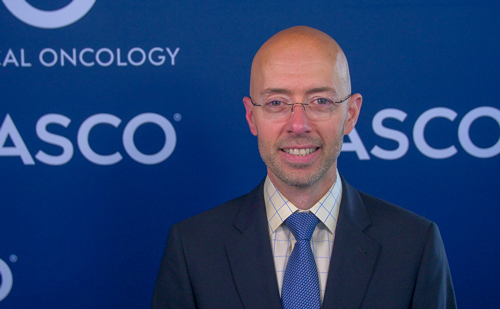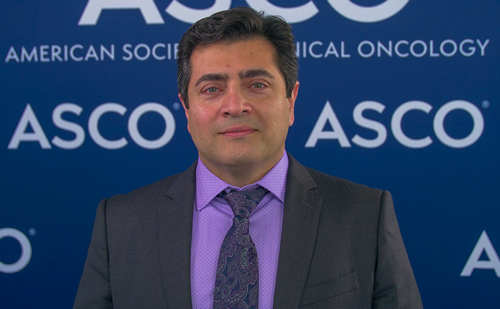Renal cell carcinoma (RCC) accounts for around 3% of all cancers worldwide1 and is a challenging disease, since approximately 20–30% of patients with RCC have metastatic disease at time of diagnosis. In addition, 20–40% of patients with localized disease who have had a surgical treatment, either partial or radical nephrectomy, will experience progression during follow-up.2 The more frequently affected organs in metastatic RCC (mRCC) are the lungs, followed by lymph nodes, liver, and bone.3 Without treatment, the survival of mRCC is lower than 8% at 5 years.4
The use of targeted therapy has become the mainstay of treatment of mRCC but is not curative; complete responses are rare and relapse inevitably occurs. Radical metastasectomy followed by observation is a commonly used strategy that has demonstrated a survival benefit in selected patients with mRCC,5 which has raised the question of whether the two treatment modalities may be combined. Small case studies have suggested that adjuvant targeted therapy may be beneficial after metastasectomy.6
The RESORT study (NCT01444807) was a randomized, open label, multicenter, phase II study, designed in 2010 to evaluate the additional clinical benefit of metastasectomy followed by sorafenib in a population of patients with mRCC.7 Eligibility criteria were a previous nephrectomy, predominant clear cell histology, a radical excision of no more than 3 metastases, and ECOG performance status 0–2. Patients were randomized within 12 weeks from surgery to receive sorafenib (400 mg twice daily) or observation for a maximum of 52 weeks, and were stratified according to time from nephrectomy to metastases (more versus less than 12 months), site of disease (lung versus others) and number of lesions (single versus multiple). The primary endpoint was relapse-free survival (RFS), defined as the time from randomization to disease relapse or death. In December 2017, investigators decided to terminate the trial early and therefore the planned sample size was not reached. Reasons for early termination included the long-time of accrual and the availability of new and more active agents in the landscape of mRCC.
An interim analysis of data from 68 patients was presented at the 54th Annual Meeting of the American Society of Clinical Oncology (ASCO), which was held in Chicago from June 1–5, 2018. The median RFS was 29 months in the sorafenib group versus 35 months in the observation group. The RFS at 12 and 24 months was 62% and 52% with sorafenib versus 74% and 59% in the observation arm, respectively. These differences were not significant when accounting for the stratification factors. Grade 3 treatment-emergent adverse events occurred in 22% of the sorafenib-treated patients compared with 3% in the observation arm. Unfortunately, only two of 32 patients receiving sorafenib was given the full dose; the remaining 30 patients had at least one interruption or dose reduction. There was a slight decrease of the recurrence risk when increasing the sorafenib dose; however the number of events observed was too small to obtain reliable estimates.8
Giuseppe Procopio, MD, from Milan, Italy, concluded his presentation with some observations. Firstly, the poor tolerability of the full dose of sorafenib was a major limitation of the study and may partially explain the negative results. In addition, further investigation might be warranted in a more homogeneous study population, such as those undergoing lung metastasectomy.
Giuseppe Procopio from Fondazione IRCCS Instituto Nazionale dei Tumori in Milan, Italy talks to touchONCOLOGY about the RESORT trial and limitations of using sorafenib in patients with metastatic renal cell carcinoma after radical resection of metastases. Full details of the interview can be found here.
References
1. Ferlay J, Soerjomataram I, Dikshit R, et al. Cancer incidence and mortality worldwide: sources, methods and major patterns in GLOBOCAN 2012. Int J Cancer. 2015;136:E359–86.
2. Lam JS, Shvarts O, Leppert JT, et al. Renal cell carcinoma 2005: new frontiers in staging, prognostication and targeted molecular therapy. J Urol. 2005;173:1853–62.
3. Bianchi M, Sun M, Jeldres C, et al. Distribution of metastatic sites in renal cell carcinoma: a population-based analysis. Ann Oncol. 2012;23:973–80.
4. American Cancer Society. Survival Rates for Kidney Cancer by Stage. Available at: www.cancer.org/cancer/kidney-cancer/detection-diagnosis-staging/survival-rates.html (accessed June 4, 2018).
5. Kim DY, Karam JA, Wood CG. Role of metastasectomy for metastatic renal cell carcinoma in the era of targeted therapy. World J Urol. 2014;32:631–42.
6. Husillos Alonso A, Carbonero Garcia M, Gonzalez Enguita C. Is there a role for systemic targeted therapy after surgical treatment for metastases of renal cell carcinoma? World J Nephrol. 2015;4:254–62.
7. Procopio G, Verzoni E, Biondani P, et al. Rationale and protocol of RESORT, a randomized, open-label, multicenter phase II study to evaluate the efficacy of sorafenib in patients with advanced renal cell carcinoma after radical resection of the metastases. Tumori. 2014;100:e28–30.
8. Procopio G, Cognetti F, Miceli R, et al. A randomized, open label, multicenter phase 2 study, to evaluate the efficacy of sorafenib (So) in patients (pts) with metastatic renal cell carcinoma (mRCC) after a radical resection of the metastases: RESORT trial. J Clin Oncol. 36:15 (suppl; abstr 4502).




